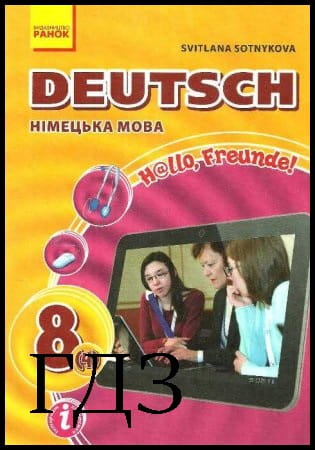ГДЗ Англійська мова 8 клас. Зошит [Карп'юк О.Д.] 2016
1 Group up the words into the columns below.
headmaster • chalk • staffroom • board • classmaster ruler • map • pinboard • gum • desk • changing room • pupil • sponge • classroom • classmate • cupboard
People: headmaster, classmaster, pupil, classmate.
Places:staffroom, gym, changing room, classroom.
Eguipment: chalk, ruler, map, sponge.
Furniture: board, pinboard, desk, cupboard.
2.
Easy: PE; music; art; computer science; technical; education.
Hard: Croatian; Science; German.
Interesting: English; geography; French.
Boring: RE; history.
3 a) Complete the sentences.
I'm good at geography.
I'm quite good at English.
I'm not very good at German.
I'm quite bad at Science.
I like PE
I don't like mathematics.
I like art best.
b) Talk to your friend. Find information about him/her. Write a report.
Ann is good at English. He/(She) is quite good at French. He/(She) is not good at Science. He/(She) likes geography but he/she does not like history. His/(Her) favourite (subject)/subjects (is)/are PE.
4 a) What's your timetable like? Fill it in.
Monday:
1. Maths
2. English
3. Computer science
4. German
5. Ukrainian literature
6. Science
7. History
Tuesday:
1. Ukrainian
2. Ukrainian literature
3. Maths
4. Science
5. Technical education
6. PE
7. Music
Wednesday:
1. Biology
2. Maths
3. Ukrainian
4. Technical education
5. RE
6. Ukrainian literature
7. PE
Thursday:
1. German
2. Science
3. Algebra
4. World literature
5. Geography
6. Chemistry
7. Art
Friday
1. Ukrainian
2. Maths
3. English
4. Geography
5. Science
6. Computer science
7. PE
b) Write what is true for you.
1I have maths every day / four times a week.
I have maths four times a week.
2I have English twice / three times a week.
I have English three times a week.
3I have RE. only once/ twice a week.
I have RE. only once a week.
4I don't have computer science / German/ maths at all.
I don't have German at all.
5I have science twice / three times a week.
I have science twice a week.
6I usually have two / three breaks a day.
I usually have three breaks a day.
7I usually have five/six classes a day.
I usually have six classes a day.
5 Circle the right verb.
1. Tom (is)/are good at English.
2. (Do)/ Does you forget to do your homework?
3. (Is)/Are science your favourite subject?
4. Do /(Does) your Ukrainian teacher shout in class?
5. Is/(Are) you interested in history?
6. Why (is)/are maths difficult for many students?
7. My headmaster's surname (is)/are Mr. Roberts.
8. (Do)/Does students study hard for their tests?
9. Ian (is)/are absent today.
6. Match the words with their definitions.
1-c; 2-f; 3-a; 4-g; 5-d; 6-e; 7-c.
7. Read the text on page 68 of your SB and put ’T' for true statements or ‘F for false ones.
1-F; 2-T; 3-F; 4-T; 5-T; 6-T; 7-F; 8-F; 9-F; 10-T.
8. Complete each sentence using a word from the 'Vocabulary Box' on page 68 of your SB.
1. British children should take national exams at the age of sixteen.
2. In year 11 they take General Certificate in Secondary Education exams that are called GCSE in short.
3. At thirteen British children can choose different subjects to study and Information Technology among them.
4. Every typical British school has got a Gymnasium and an Assembly Hall.
5. British children go to a primary school until they are 11.
6. In most secondary schools schoolchildren have to wear uniforms.
7. If British schoolchildren are going to study at the University they should take two or more 'A' level exams after their GCSEs.
9 Complete the crossword.
DOWN *
1Approval given by someone in authority to do something.
2The act of making someone suffer because he or she did something wrong.
3A written permit that gives someone or something the right to organise something under certain rules.
4The act of telling someone what is wanted or something asked for.
ACROSS
3 The subjects that are taught at school or the things that are studied in a particular subject.
5A feeling of admiration or high regard for someone or something, or consideration, special care.
10. Match the words with their definitions.
1-b; 2-a; 3-c; 4-i; 5-h; 6-d; 7-e; 8-g; 9-j; 10-f.
11. DON'Ts
Leave the things you have to do for later be late for school stay up late cheat at test skip classes chew gum at the lesson talk at the lessons.
DOs
Do your best You need a good sleep every night revise for the test ask your teacher for help if you do not understand do your homework be attentive at lessons respect teachers listen to the teachers.
12.
What's the message? Do you agree? Yes, I do.
b) Try to write the clues for this crossword puzzle.
ACROSS →
1. A place where pupils study.
2. A school subject in which you learn painting.
3. A kind of furniture where we put cups.
4. A kind of furniture with writing for pupils to sit at.
5. Something that attracts your attention.
6. A great distance when you measure from one end to the other.
DOWN ↓
1. A person who studies.


 29.10.2017,
29.10.2017,
 5 502,
5 502,
 0
0
 Назад
Назад
![ГДЗ Природознавство 5 клас. Підручник [Ярошенко О.Г., Бойко В.М.] 2018 ГДЗ Природознавство 5 клас. Підручник [Ярошенко О.Г., Бойко В.М.] 2018](/uploads/posts/2019-04/1555779316_5_p_y_u2018.jpg)
![ГДЗ Основи правознавства 9 клас. Підручник [Наровлянський О. Д.] 2017 ГДЗ Основи правознавства 9 клас. Підручник [Наровлянський О. Д.] 2017](/uploads/posts/2019-02/1550928122_9k_p_n_2017.jpg)
![ГДЗ Українська мова 8 клас. Підручник [Глазова О.П.] 2021 ГДЗ Українська мова 8 клас. Підручник [Глазова О.П.] 2021](/uploads/posts/2021-10/1633720388_8k_y_g_2021.jpg)
![ГДЗ Вступ до історії 5 клас. Підручник [Гісем О.В.] 2018 ГДЗ Вступ до історії 5 клас. Підручник [Гісем О.В.] 2018](/uploads/posts/2019-07/1564163269_5k_i_h_2018.jpg)